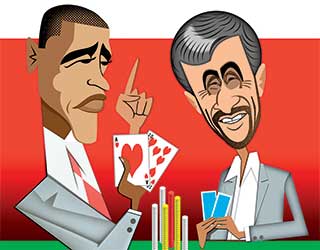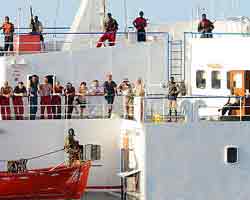President Obama has been preoccupied with Iraq, Afghanistan, and most recently North Korea, but his attention will soon inevitably turn to one of Washington’s greatest diplomatic wild cards: Iran. A new white paper (PDF) prepared by a group of former US ambassadors and progressive foreign policy experts urges the Obama administration not to succumb to hawks pushing an unduly harsh and counterproductive stance regarding Iran. At issue is how to prevent Tehran from acquiring nuclear weapons. In clear reference to Iraq invasion (remember those elusive WMDs Saddam was supposedly stockpiling?), the Iran Nuclear Policy Group warns, “publicly assuming the worst in the absence of evidence–and issuing an ultimatum based on that assumption–is a singularly bad idea.”
The Group instead suggests a three-part approach to the problem, emphasizing reliance on facts rather than hype (a novel idea), a clear expression of US foreign policy goals in a way that leaves Iran space to manuever and save face, and “true diplomacy” that emphasizes not “the bad things that American can do to Iran but… things that the United States can withhold,” namely foreign investment, diplomatic respect, and help developing Iran’s oil and gas sectors.
See the white paper for details on the group’s recommendations. Its conclusion, though, is clear in its criticism of past approaches and the resulting setbacks Washington has suffered:
For five years, efforts to coerce Iran to stop enriching and answer potentially embarrassing questions have failed. Sharpening the sticks and sweetening the carrots will not change that.
The current path leads only to a painful choice between escalating to armed conflict or backing down in embarrassment. A change of course is needed. We expect hardliners in Tehran will crow over any concession that opens the door to the possibility of enrichment in Iran. In diplomacy, as in war, however, a tactical shift to more defensible terrain is often the key to success.
What is needed now is a calm, firm, measured and principled response that clearly defines and protects U.S. vital interests; respects the rights and legitimate interests of Iran; and finds a way for Iran to accommodate U.S. core interests while also advancing its own. This statement has outlined the key elements of a diplomatic strategy that we believe meets these conditions and has the best chance of succeeding.















